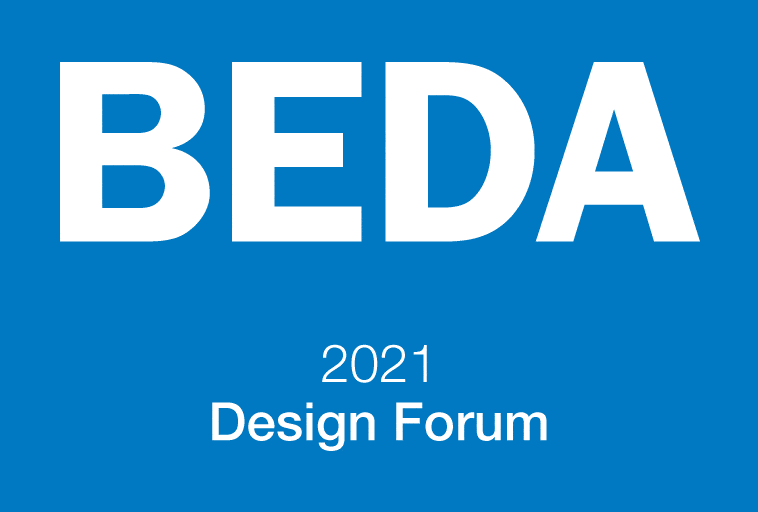
BEDA Design Forum: 'An era of global transformations — and design in transition'. Päivi Tahkokallio
The BEDA Design Forum 2021 on 27 May was kindly hosted by Cité du design, the home organisation of BEDA’s new President Isabelle Vérilhac, who has now started her term. We had all hoped that we could all meet face-to-face in St. Étienne, in the French city where design has long successfully met with commerce and technology. Instead, we still met – but online. Warm thanks are due to the great team of Cité du design for nevertheless succeeding to create such a welcoming and lively atmosphere on the digital platforms.
The core thought in putting the Design Forum programme together was to give the voice to BEDA Members and to our stakeholders alike — to create a dialogue between and across.
From Systemic Design Framework to The Big Idea
The case studies and approaches presented during the first session of the day, for example, the UK Design Council’s presentation on the ‘Systemic Design Framework’; CLICK NL’s and the Dutch Design Foundation’s, ‘Open Coalition on the New European Bauhaus’, and The Design and Crafts Council of Ireland’s and the Institute of Designers in Ireland’s joint presentation on, ‘The Big Idea’, involving young people, showed to all attending, the diversity of voices in design in Europe.
The second session of the day focused on the role of design in transformation. The twin transformation on climate change and digitalisation certainly requires our attention in all parts of Europe at the moment, across various layers of administration. We know that the role of local administration is critical for the success of these transformations. How can design best support?
‘The public sector needs to learn to fail’
Johannes Helama, Project Manager for Open Agenda in Ii in Finland, where participatory co-design methods have been used for many years to ensure that the 10,000 inhabitants of the municipality can participate and have their voice heard in processes that citizens find meaningful, showed that even a small municipality can successfully decide to invest in design. Ii was the winner of the European Commission’s RegioStars Awards category in Energy Union / climate change already in 2017, and the work to mitigate climate change continues together with the inhabitants every day. Johannes reminded attendees of the importance of trust in co-design processes — and trust between citizens and local administration is always a process. It needs to be developed over time. Equally important is for citizens to feel that their participation is meaningful, that it is not done for the administration, but to genuinely improve citizen’s lives. To reach this, the public sector also needs to learn to make mistakes with the citizens.
The role of design needs to change too
I want to thank Iulia Mirela-Serban, Assistant to the Director-General, Directorate-General for Regional and Urban Policy (REGIO) and Laura Hageman-Arellano, Unit G3 -Inclusive Growth, Urban and Territorial Development (REGIO) together with Xavier Troussard and Vera Winthagen from the Commission’s New European Bauhaus Team, for sharing their insight on ambitions and tools related to the ongoing transformation processes. It was recognised in the discussion that even if the Cohesion policy and initiatives included support integrative and participatory processes, adoption of design is still far from mainstream — also in local administrations where excellent case studies already exist. It was also noted that as much as the role of public sector is changing, the role of design needs to change as well. In the context of the New European Bauhaus, the initiative is an open-ended process and the goal is not to ’lead from Brussels’, but to serve and support change and local actions through inspiring communities of doers.
In the third session, BEDA opened a dialogue beyond Europe, and had, for example, invited representatives of IxDA, (a global community of 120,000 UX design professionals), and Cumulus, (a global network on education in art, design and media with 340 member institutions in more than 60 countries), to join the discussion. Much of the discussion circled around local story-telling, and ripples that create impact — elements in transition and transformation.
The notion I would like to leave you all with
Europe — and the world — is in the middle of transformations, and we pay a lot of attention to the most urgent transformation climate change, or to digitalisation. Reminded by the ongoing pandemic we have had a strong reminder of our vulnerability, and of the vulnerability of our systems. We try hard to understand the impact of our actions. What the design community needs to remember is that when the world around you changes, you need to change too. If you want to create a meaningful impact, you have better change proactively than to just drift along, or to let everyone else define how you should change. This is what BEDA is needed for — a platform, a family of design organisations to help the design community define a meaningful transition for itself, so designers can develop meaningful tools to help transformation in other fields.
Thank you
I warmly thank you all. My term as President of BEDA is now closed, and the BEDA ship will be steered by the great Isabelle Vérilhac. The community is in very capable and steady hands. She will be supported by the new Vice President Christina Melander, who will bring decades-long experience on design policy with her. Onwards and upwards, as our Consulting Managing Director Michael Thomson always puts it so well, onwards and upwards.
Päivi Tahkokallio
President of BEDA 2019—2021
